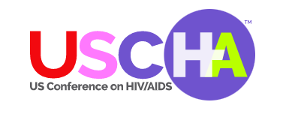NIH OAR Leadership at the U.S. Conference on HIV/AIDS

In early December, the National Institutes of Health (NIH) Office of AIDS Research (OAR) was honored to play an important role at the virtual U.S. Conference on HIV/AIDS (USCHA) 2021. The host organization, NMAC, is an advocacy consortium whose mission is to “lead with race” to champion health equity and racial justice to end the HIV epidemic in the U.S.
NIH OAR had a prominent role in two activities at this year’s conference. On December 2, I joined distinguished colleagues from the federal government for a town hall discussion on aging and HIV that focused on the provision of adequate care and services to older adults with HIV. The panel was hosted and moderated by Mr. Moisés Agosto-Rosario, Director of Treatment for NMAC. Fellow panelists included Mr. Harold Phillips, Director of the White House Office of National AIDS Policy (ONAP); Dr. Laura Cheever, Health Resources and Services Administration (HRSA) Associate Administrator for the HIV/AIDS Bureau; and Mr. Edwin Walker, U.S. Department of Health and Human Services (HHS) Deputy Assistant Secretary for Aging.
Panelists provided overviews of their respective agencies’ HIV programs and aging-related activities. My remarks focused on the research aspects of aging and HIV. We discussed how NIH OAR coordinates NIH Institutes, Centers, and Offices (ICOs), and establishes research priorities and strategic direction. Research areas key to improving the quality of life of older persons with HIV include chronic comorbidities, neurological complications, frailty, and polypharmacy issues. Because more than half of persons with diagnosed HIV in the U.S. are older than age 50, these health issues affect the delivery of competent, stigma-free health services. NMAC’s National HIV and Aging Advocacy Network engaged panelists in a discussion on an array of topics and issues, such as the prevention and treatment of cognitive impairment among people aging with HIV; the prevention and management of comorbidities; and the provision of screening and geriatric HIV services, care coordination, and case management services for people with HIV older than age 50.
On December 3, NIH OAR conducted a listening session at the USCHA to gather diverse perspectives from participants to help evaluate and shape the evolution of the NIH HIV research agenda. The session was moderated by the Executive Director of NMAC, Mr. Paul Kawata. Prior to the listening session, NIH OAR circulated a series of questions to conference registrants, inviting them to provide input to guide the discussion regarding the responsiveness of the NIH HIV and AIDS research program and priorities to emerging scientific advances and the needs of diverse communities.
The session was characterized by a dynamic exchange of information and ideas among participants that focused on—
- Research questions including equity in research participation, HIV over the life course, long-acting injectables for HIV prevention and treatment, strategies for an HIV cure, and health communication and dissemination.
- Training, infrastructure, capacity building, community engagement, and outreach efforts to ensure diversity of HIV researchers and assurance of access to NIH-supported research findings for all stakeholders.
- How to address the impact of the COVID-19 pandemic on HIV research, particularly in regions most severely affected by both pandemics.
NIH OAR will consider all the valuable feedback received from this and other sessions to inform NIH HIV research program activities and the continued development of the HIV research agenda.
On behalf of NIH OAR, I would like to extend my appreciation to these esteemed colleagues for their participation in the listening session panel:
- Ángel Luis Hernández, HIV Community Educator, University of Puerto Rico, Comprehensive Cancer Center
- Bridgette Picou, LVN, Community Advisory Board Member and Blogger, The Well Project
- Dana Williams, Executive Director and Co-Founder, The Community Wellness Project
- Jesse Milan, Jr., J.D., President and CEO of AIDS United
- Kekoa Kealoha, HIV Medical Case Manager, Kumukahi Health + Wellness
- Lance Toma, LCSW, Chief Executive Officer, San Francisco Community Health Center
- Pamela Foster, M.D., M.P.H., Professor, Community Medicine/Population Health, The University of Alabama School of Medicine
- Paul Kawata, Founder and Executive Director, NMAC
I encourage you to visit the USCHA website to learn more about the robust agenda and important topics that were discussed. To learn more about past listening sessions hosted by NIH OAR, please visit the NIH OAR HIV Stakeholder Outreach and Engagement Report: June 2018 – February 2020.
Maureen M. Goodenow, Ph.D.
Associate Director for AIDS Research and
Director, Office of AIDS Research
National Institutes of Health
Read last month’s blog.
This page last reviewed on December 10, 2024

